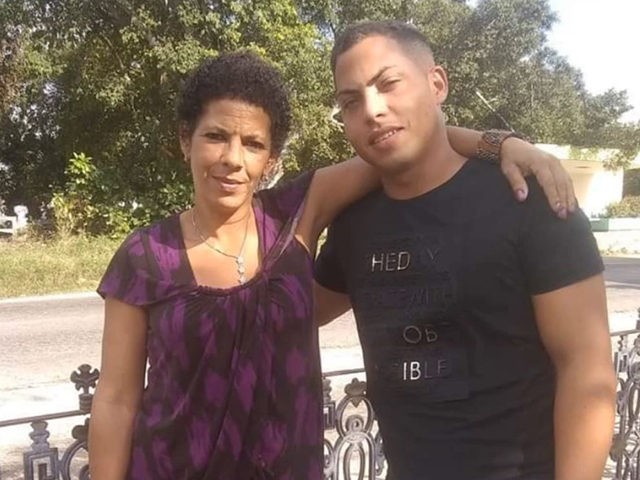Miriela Cruz, a Cuban woman arrested on July 11 for wearing a shirt reading “down with the dictatorship,” described being brutalized and tortured in putrid jail cells in an interview shortly after her release, the Cuban independent site ADN Cuba reported Wednesday.
Cruz shared her story in audio posted to Facebook on Tuesday by Anamely Ramos, a longtime anti-communist dissident and member of the pro-democracy artist collective the San Isidro Movement. The head of the movement, Luis Manuel Otero Alcántara, disappeared on July 11 and has not been seen since. Human rights activists presume Otero is in police custody, one of hundreds confirmed to be imprisoned or disappeared since that date.
Thousands of Cubans took the streets of nearly every major city in the country — as many as 40 municipalities, according to some estimates — for protests against the Communist Party on July 11. The protests were overwhelmingly peaceful, largely consisting of assemblies of moving marches through major streets and chants of “freedom!” Police responded by opening fire with live ammunition into armed crowds, publicly beating protesters they could apprehend, and imprisoning and torturing anyone within sight of a protest, including minors.
Cruz’s son, 26-year-old Dayron Fanego, was arrested during the protests in San José de las Lajas, a Havana metropolitan area suburb. Police arrived at Fanego’s home and dragged him off of his own doorstep. As in many similar cases, Cruz said that police refused to give her information on her son, so she decided to wear an anti-communist shirt to the local police station. Her shirt featured several anti-regime slogans including “down with the dictatorship,” “no more hunger,” and “no more repression.”
Police immediately arrested Cruz, which at least allowed her to see her son in prison. Police took her to a local prison with no accommodations made for her advanced age or her cancer status, but not before tearing her shirt off and beating her at the station.
“They hit me so much that I arrived defecated to the prison,” Cruz said in the audio interview.
“In the cell, there were 20 of us women, there was one cup for all 20, there was Covid [Chinese coronavirus] in the prison,” Cruz detailed. Cancer patients are at heightened risk for coronavirus complications, a fact that did not prompt Cuban authorities to offer Cruz any differentiated treatment after the beating from younger, healthy prisoners. “We drank water from a bucket in the bathroom, [there was] extreme dirtiness.”
Cruz said that she witnessed and experienced regular beatings during her seven days in prison, and saw her son beaten, as well.
“They forced people to say ‘viva Díaz-Canel’ and ‘viva Cuba’ by beating them. There were people there with fractured arms, blows to the head, bruises,” Cruz narrated. “They beat me mercilessly.”
Cruz also accused police officers of shaming her by forcing her to walk around the prison in only a brassiere and parade in front of military officials there. Women and girls slowly coming out to speak about their abuses in prison following the July 11 protests have similarly testified to sexual abuse or threats of rape. In one dramatic account, 17-year-old Gabriela Zequeira said police officers threatened to lock her in a room with two men who would rape her and forced her to strip naked and digitally penetrate herself, allegedly to confirm she was not trying to smuggle weapons into the prison. Zequeira was arrested for being near a protest but did not participate in any.
Ramos, who posted the audio of Cruz’s testimony, noted on Facebook that police only agreed to let Cruz go after she signed a false guilty plea on charges of armed robbery.
“She told the officials that, without glasses, she could barely see, but they insisted that it was just the bail paper,” Ramos noted. She added that a team of activists are documenting Cruz’s case, and the many individual cases slowly trickling out of Cuba, with international human rights organizations in an attempt to bring awareness to each individual case and thus pressure the regime not to act violently against those involved.
Fanego remains in prison at press time.
The Castro regime has denied any use of violence against protesters despite the many testimonies and video evidence of such acts. The denials followed President Miguel Díaz-Canel’s call for an “order of combat” urging civilians to violently assault “counterrevolutionaries” wherever they may be suspected to exist. To limit the flow of information abroad, authorities shut down internet access from the state-run telecommunications company ETECSA on the first day of the protests. While Cubans have had some success smuggling audio and videos out of the country with VPNs, and independent journalist outlets continue to operate even while many of their staffers remain missing or imprisoned, the lack of communication with the outside world and among Cubans on the island has limited the ability to recreate the protests of July 11.

COMMENTS
Please let us know if you're having issues with commenting.